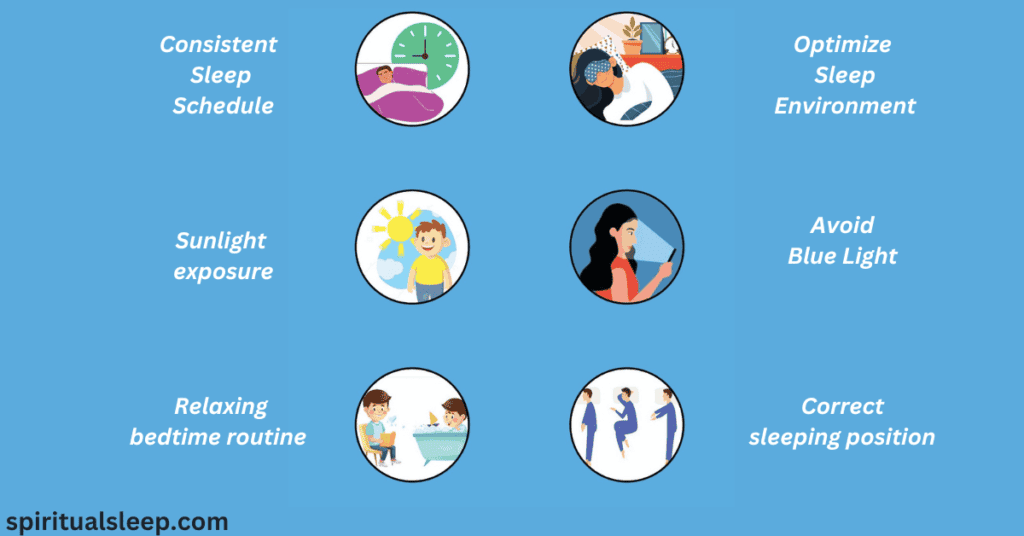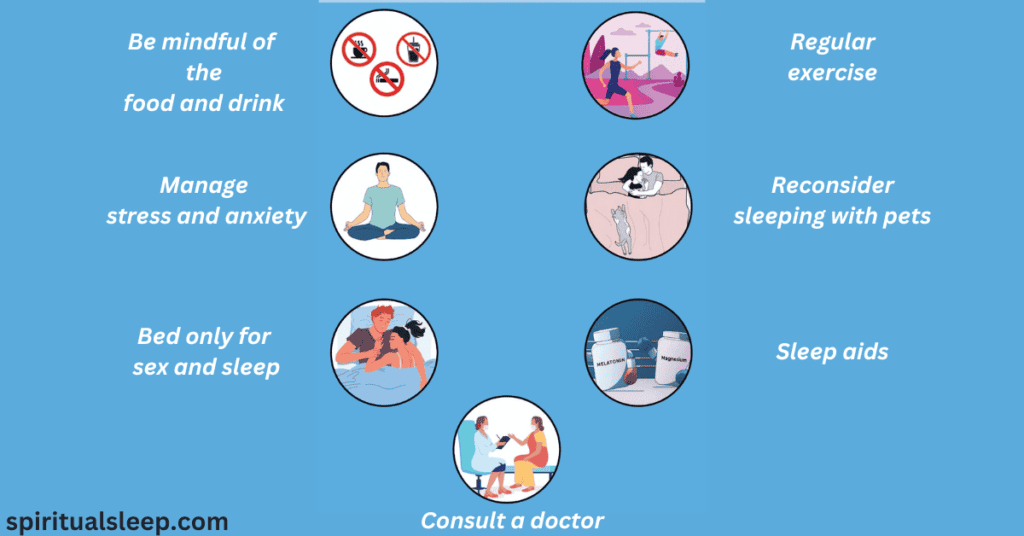How To Sleep More Than 5 Hours
Understanding sleep needs
Complete and restful sleep is essential for mental and physical health. Much research shows that lack of sleep can cause many psychological and physical ailments. Quality sleep resets your body and is one of the best things you can do for your overall well-being.
Research shows you need seven to nine hours of sleep daily for optimal daily functioning. The Mayo Clinic provides general sleep recommendations that align with age and health needs. Here’s a summary of typical sleep guidelines.
| Age Group | Recommended Sleep |
|---|
| Infants (4-12 months) | 12-16 hours per 24 hours (including naps) |
| Toddlers (1-2 years) | 11-14 hours per 24 hours (including naps) |
| Preschoolers (3-5 years) | 10-13 hours per 24 hours (including naps) |
| School-age children (6-12 years) | 9-12 hours per 24 hours |
| Teenagers (13-18 years) | 8-10 hours per 24 hours |
| Adults (18+ years) | 7 or more hours per night |
If you want to get your complete daily sleep but can only sleep four to five hours, it is essential to understand your sleep needs, the optimum number of hours for your daily functioning, and why you are not getting that sleep.
As a medical professional, I have provided several methods below so that you can understand your sleep needs and identify why you are not getting enough sleep.
Here are 13 ways by which you can achieve your goal of more than 5 hours of sleep.

1. Consistent sleep schedule
The first thing you must look at is your daily bedtime routine. You have to fix your daily sleeping time and the time you wake up. Try not to change it, even on the weekend.
If you are still having too much difficulty with your routine and a fixed time is difficult, I suggest you focus only on your waking up time. Forget that you sleep late at night, your sleep schedule will reset soon if you wake up at a fixed time because it will create more fatigue during the day, making you feel sleepy earlier at night.
I follow the same advice for myself. I focus on waking up time when I need to change or reset my sleep schedule because, being in the medical profession, sometimes duty timings change every month, and we have to adjust accordingly.
It would help if you tried to get up at a fixed time in the morning, whether at six, seven, or eight. Place your alarm clock outside your room and keep your door open, or put it in a high place so you have to get out of bed to turn it off. After that, go for a shower and have your breakfast or coffee. Do not go to your bed again.
The second thing that you have to take care of is that you do not sleep during the day, and if you still have to sleep during the day and are unable to work, you should not nap for more than 30 minutes.
If you sleep for more than 30 minutes, you may go into a deep sleep. Sleeping again at night may be difficult if you sleep for a few hours. It will not be of any use to wake up early.
2. Optimize your sleep Environment
For a peaceful sleep, you must also ensure that the environment you are sleeping in is best for you. If you wake up often at night, you should check whether your environment is suitable or what issues bother you.
So, whatever your issue is, try to note why you’re not getting sleep. If it’s because of your room, bed, etc., here are some things you can do to improve your sleep environment.
- Maintain your bedroom temperature between 60-67 degrees Fahrenheit( 15-19 degrees Centigrade)
- Ensure your room is dark. Consider an eye mask or black curtains.
- Use white noise or air plugs to block disruptive sounds.
- If you have chronic pain, you should adjust your position accordingly. Mattresses and pillows should be comfortable.
3. Get Enough day time light exposure
You should get plenty of Daytime Light exposure because it stimulates your body’s internal clock. Daylight determines when you feel alert and when you feel sleepy. It would be best to spend at least 30 minutes in light daily.
Daily exposure to sunlight and exercise will improve your circadian rhythm and help you produce vitamin D. Vitamin D has many benefits, but most people are deficient in it.
Research has found that vitamin D deficiency can lead to sleep disorders and shorter sleep durations. You can recover from this deficiency by improving your diet and exposure to sunlight. Doctors recommend supplements after checking your vitamin D levels.
4. Limit exposure to blue light
Blue light before bed at night makes it harder for you to fall asleep and reduces melatonin production in your body. Melatonin is a hormone that regulates your sleep-wake cycle. You can boost it by getting sunlight and eating melatonin-rich foods.
Reducing screen brightness and maintaining a distance of at least 14 inches from the face can help mitigate these effects (Mayo Clinic News Network).
- Avoid screen phones, tablets, and laptops for at least two hours before Bed.
- You can use blue light protectors on your screens. This will improve your sleep and eye health.
- Use blue light filters or apps that adjust screen lighting based on the time of the day.
5. Establish a relaxing bedtime routine
The routine before going to bed also greatly influences the quality of your sleep, and having a calm routine before going to bed makes you sleepy early.
- You can read your favorite book until you feel sleepy, then close the book and go to sleep.
- Have a warm bath before going to bed. It may help calm your mind and relax your body.
- Do meditation. Close your eyes, try some techniques, and practice them daily before bed.
- Journaling also helps you unwind your thoughts. You can write about your daily routines or your random thoughts. You will feel much better. I do gratitude journaling, which improves my sleep quality a lot.
- Stretching exercises help relax your nerves, reduce your anxiety, and help you sleep faster.
- Avoid stimulating and stressful activities and conversations before bed.
6. Best sleeping position
Correct sleeping position is essential for the quality of your sleep. Which position is better for you depends on your health conditions.
- If you have sleep apnea, sleeping on your back will not benefit you. It will make your snoring worse. Sleeping on your sides is considered the best, as sleep experts recommend.
- If you are pregnant or If you have GERD, the left-side position is better for you.
- If you have heart conditions, then the right side position is better.

7. Be mindful of the food and drink
The diet you consume at bedtime can impact your sleep. Here are some things to consider.
- Avoid caffeine, alcohol, and nicotine before bed.
- Consider a light snack, such as a banana, Low-fat cottage cheese, cherries, or Brazil nuts, if you are hungry.
- Avoid drinking before bed. Try not to drink for 1 to 2 hours before bed.
8. Incorporate regular exercise
Regular exercise is good for physical and mental health. If your overall health improves, the quality of your sleep will also improve. Daily exercise reduces mental stress and increases your coping capacity.
At least half an hour of daily light exercise should be done. Don’t do heavy exercises before bed. Remember to keep yourself hydrated.
9. Manage stress and anxiety
Mental stress and anxiety can make it difficult for you to sleep, especially anxiety and panic attacks that keep you awake throughout the night. So, it is essential to address these issues first, and your sleep quality will automatically improve.
- relaxation practices such as deep breathing, progressive muscle relaxation, and guided imagery to enhance your well-being and manage stress.
- Consider meditation, mindfulness, journaling, or cognitive behavioral therapy(CBT) to manage anxiety.
10. Rethink sleeping with your pets
If you don’t sleep alone at night and are a light sleeper, you may wake up even from a slight disturbance by your pet or when your changes position in bed. Light sleepers can also wake up from the subtle touch, smell, sounds, light, and movements.
11. Bed only for sex and sleep
Reserving your bed solely for sex and sleep is a crucial principle of good sleep hygiene. This approach helps your brain associate your bed with relaxation.
Switching off and falling asleep can become more challenging when you use your bed for activities like watching TV, eating, or working.
By reserving your bed solely for sleep and intimate activities, you reinforce the mental connection between your bed and restful sleep. This practice can make it easier to Improve your sleep quality and fall asleep faster. Additionally, maintaining this boundary can help reduce insomnia and other sleep disorders.
12. Consider sleep aids, but use them wisely
Addressing sleep issues through Lifestyle changes is better. Sometimes, sleep aids can be beneficial. Before training yourself to sleep better, you should first note your regular sleep patterns at night.
Over-the-counter sleep aids or supplements should only be used as a short-term solution, not a long-term one. And I would recommend that you take the advice of your sleep specialist before considering sleep aids.
13. Seek Professional Help If Needed
If you have tried these strategies and still struggle to sleep more than 5 hours, it might be time to seek professional help.
- Consult a Sleep specialist or your primary care physician
- Consider some potential underlying conditions such as insomnia, Sleep Apnea, and restless leg syndrome.
FINAL THOUGHTS
Remember, the best approach is to focus on your diet, exercise, and work-life balance. I have mentioned all non-medical strategies that can help you achieve the goal of more than 5 hours of sleep tonight. After that, you can consider medical options.
Prioritize your sleep as an essential part of your health, and don’t hesitate to seek professional help. By implementing these techniques, you can work towards better health and Well-being.
So, are you ready to get your sleep better and longer?


218GB PRIVATE Amateur Videos MAGNET TORRENT DOWNLOAD
CP LINKS ONION CP ONION LINKS HENTAI KIDS DERKNET CP
218GB MAGNET LINK FOR TORRENT CLIENT (ADD URL) magnet:?xt=urn:btih:abd5aaed52b5994fe54136701c4c18156bd28415
WEBSITE LINK: FOR TOR BROWSER http://torx5mtxatfovjmdizm27tsqusa4bgej5qx7zvv2quxvh44spl5xzsad.onion